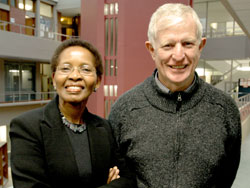Literature and psychology booked together
31 July 2007
Healing words: Assoc Prof Pumla Gobodo-Madikizela and Assoc Prof Chris van der Merwe have married literature and psychology in their new book, Narrating our Healing - perspectives on working through trauma.
A new book, born out of a postgraduate course and a Summer School programme, combines two disciplines - literature and psychology - to offer victims of trauma hope for a new lease on life.
What's been running as a master's course since 2003 and developed into a series of summer school lectures in 2005 has now been turned into a book that marries literature and psychology.
The book, Narrating our Healing - perspectives on working through trauma, was co-authored by Associate Professor Chris van der Merwe of the School of Languages and Literatures and Associate Professor Pumla Gobodo-Madikizela of the Department of Psychology.
Van der Merwe and Gobodo-Madikizela sparked great interest when they started the master's course in narrative, trauma and memory in 2003. They did a five-lecture stint at the Summer School in 2005 and, based on the feedback, thought it appropriate to target a greater audience. "This work informed the outcome - a book," says van der Merwe. "Like the five lectures, there are five chapters in the book."
But how does literature and psychology come together?
"There is an increasing interest in narrative in all fields of humanities," explains van der Merwe. "There is a link between these fields. The link is the link of narrative."
And that, too, is the link between literature and trauma.
"In dealing with trauma there is a tension to tell what happened and not telling because it's so painful," says Gobodo-Madikizela. And for that reason, narrative heals.
It's not just about the spoken word, says van der Merwe. "We tend to regard our lives as narratives. Trauma shatters our narratives. This book considers the process of recreating those shattered narratives."
Though written from the South African perspective, the work has a much broader relevance. It deals with the overwhelming nature of traumatic suffering, yet offers some hope of healing.
"It is a timeous and exciting study that should be essential reading for anyone grappling with our present, our past and our future," says author Professor André P Brink, honorary professor and research associate at UCT.
 This work is licensed under a Creative Commons Attribution-NoDerivatives 4.0 International License.
This work is licensed under a Creative Commons Attribution-NoDerivatives 4.0 International License.
Please view the republishing articles page for more information.








